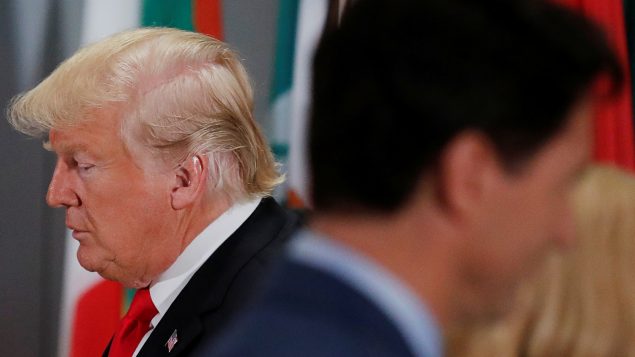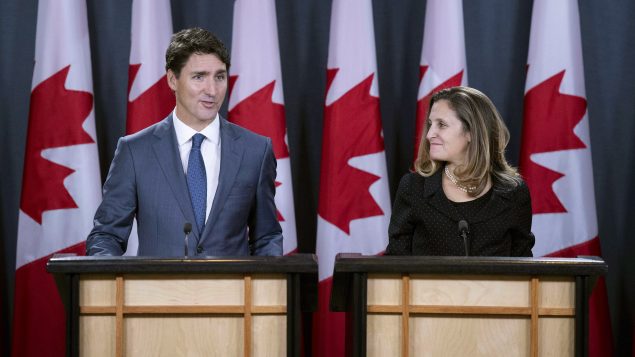The Liberal government of Prime Minister Justin Trudeau heralded the revamped trade pact between Canada, the United States, and Mexico as an agreement that would be “good for Canadian workers, good for Canadian business and good for Canadian families” when enacted.
Flanked by Foreign Affairs Minister Chrystia Freeland, who led the Canadian team of negotiators throughout the often intense and sometimes dramatic talks over the last 14 months, Trudeau told reporters in Ottawa that the new agreement in principle preserves many of many aspects of the original North American Free Trade Agreement (NAFTA).
The new deal, formally called the United States-Mexico-Canada Agreement, removes uncertainty for Canadian manufacturers and investors and improves labour rights for all North Americans, Trudeau said.
(listen to Prime Minister Justin Trudeau explain why he thinks Canada got a ‘good deal’)
Listen“A year and a half ago with rising questions about the future of NAFTA, I was asked how we would respond,” Trudeau said.
“My answer was that we’d respond as Canadians always have in uncertain times. We’d be constructive, and reasonable, but we’d also be firm. We’d protect our interests and promote our values. We’d show determination, and also flexibility, and we would remain united and ultimately we’d emerge stronger. That’s exactly what we did.”
Free trade deal but no relief on aluminum and steel tariffs
The agreement, reached on Sunday night just before a midnight deadline imposed by the U.S. to include Canada in a deal reached with Mexico in August, also preserves a crucial dispute resolution mechanism Ottawa had fought hard to protect.
However, while protecting Canada’s automotive industry from potentially devastating U.S. tariffs, the new deal includes no assurance that Washington will lift punitive measures it imposed on Canadian and Mexican steel and aluminum in June.
Trudeau had made clear he felt the tariffs should be removed before the new free trade pact could be signed, but U.S. President Donald Trump’s administration has refused to act for now.
“Moving forward on eliminating the tariffs on steel and aluminum remains a priority for us, for Mexico, and is something the Americans have indicated they are more than willing to work on,” said Trudeau.
The United Steelworkers of Canada union called the agreement a “sellout” for steel and aluminum workers.
Business groups largely praised the new agreement, which maintains Canada’s duty-free access to the huge and profitable North American market.
Nearly 75 per cent of Canada’s exports go to the U.S., making access to the American market a matter of critical importance for the Canadian economy.
- A dispute resolution process (formerly Chapter 19 of NAFTA) remains in place.
- The U.S. gets access to 3.6 per cent of Canada’s dairy market.
- Tariffs on steel (25 per cent) and aluminum (10 per cent) remain under Section 232 national security grounds.
- Auto tariff exemptions for 2.6 million Canadian autos exported to the U.S., far exceeding the current export rate of 1.8 million.
- Duty-free purchases through e-commerce jump to $150 from the current $20.
‘The most important trade deal’
Under the new agreement Canada was also forced to open a portion of its highly protected supply management system for dairy, poultry and eggs to U.S. agricultural exports.
“We had to make compromises, and some were more difficult than others,” Trudeau said, promising full compensation to dairy farmers who might suffer. “We never believed that it would be easy, and it wasn’t, but today is a good day for Canada.”
U.S. President Donald Trump on Monday said the new trade deal will support hundreds of thousands of well-paying American jobs.
Trump called USMCA “the most important trade deal we’ve ever made by far,” replacing NAFTA, which he said was “perhaps the worst trade deal ever.”
‘The only problem with Justin he loves his people’

U.S. President Donald Trump passes by Canadian Prime Minister Justin Trudeau during a working luncheon for world leaders at the 73rd session of the United Nations General Assembly at U.N. headquarters in New York, U.S., September 25, 2018. (Carlos Barria/REUTERS)
Trump acknowledged his personal relationship with Trudeau “got a little bit testy in the last couple of months,” but said that their recent tensions didn’t affect the deal-making.
“He’s a professional. I’m a professional,” Trump said, calling it a “fair deal.”
“We have a great relationship with Canada, I think now it would be better than ever,” Trump said. “The only problem with Justin he loves his people and he is fighting hard for his people.”
Trump said his biggest concession to Canada was the fact that they signed the deal at all.
“We could have done it a different way but it would have been nasty and it wouldn’t be nice and I don’t want to have that,” Trump said.
Trump vowed to sign the new deal by late November and send it to Congress for approval.
With files from AP, Reuters and CBC News







For reasons beyond our control, and for an undetermined period of time, our comment section is now closed. However, our social networks remain open to your contributions.